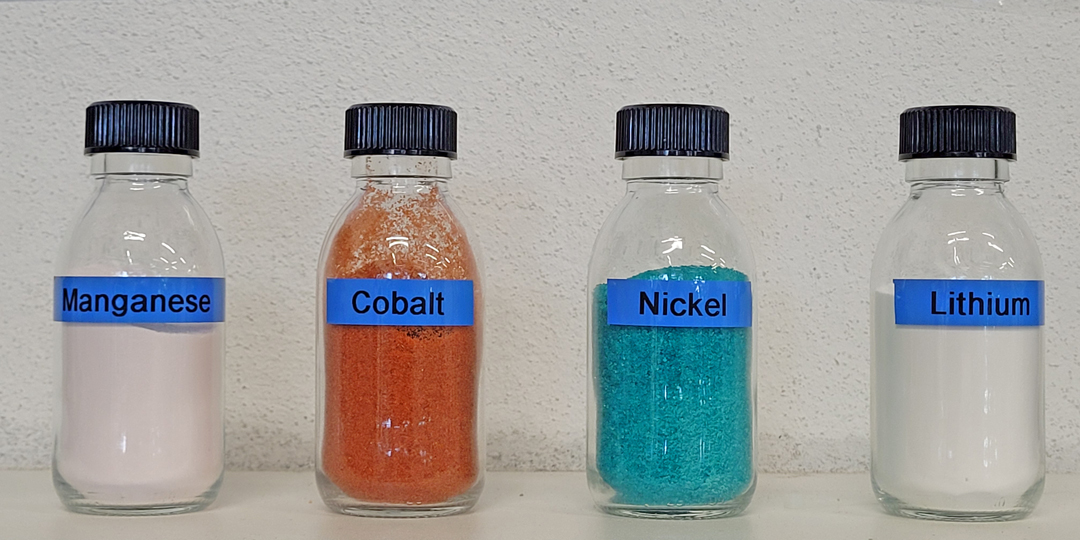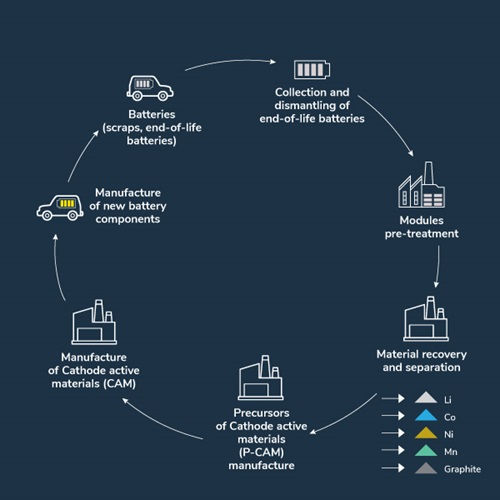
Orano invests in recycling of electric vehicle batteries

Electric vehicles: a growing market
The European Union (EU) is committed to the Green Deal aiming to achieve carbone neutrality by 2050. This objective supposes the decarbonation of priority sectors emitting the most greenhouse gases (GHG), starting with transport. The electric vehicle (or EV) offers an alternative to the use of carbon-intensive fossil fuels and looks to be a sustainable solution for climate, particularly in France, where 90% of the electricity generation is decarbonized.
In France, about 40% of cars should be electric (either all-electric “BEV” or plug-in hybrid “PHEV”) by 2030. Worldwide, the number of electric vehicles on the road is expected to reach 100 million, from 10 million today. This surge in the volume of electric vehicles will generate strong growth in demand for lithium-ion batteries, the main technology used to replace today's internal combustion engine. Therefore, battery production capacity in Europe should be 500GWh by 2028, and possibly in excess of 1TWh by 2030 (compared to a few GWh today). These batteries contain many strategic and expensive metals necessary for their operation.
The emergence of a recycling industry thus becomes a necessity for anticipating production drops or discarded materials (between 5 and 20% of the production of gigafactories), end of life for batteries, and the recovery of high value metals in short supply in Europe. Efficient recycling processes will help "close the loop" so that materials from used batteries can be reused in new batteries, while creating sustainable jobs in France and Europe to strengthen the EU's strategic autonomy.
A European regulatory framework in favor of low-carbon electric mobility
In August 2023, European regulations on batteries and their waste came into force. It is aimed at developing a value chain of batteries, including those of electric vehicles in Europe and encourages a sustainable circular economy. It introduces obligatory requirements in terms of durability, security, and labeling for the commercialization and commissioning of batteries, as well as obligations in terms of managing the end of life and procuring raw materials. The regulations aim for 70% recycling of batteries in electric vehicles by 2030 and a high recycling rate for metals.
An innovative process for recycling electric batteries

The Orano group has over 40 years of recognized expertise across the entire nuclear fuel cycle (mining, chemistry/conversion, recycling, transportation, engineering, etc.), in the chemistry of materials and in hydrometallurgy, with proven capacity in industrializing advanced processes.
In the face of a global and European market with strong growth, specialized actors in the automotive sector and/or recycling are interested in recycling batteries in Li-ion electric vehicles.
Orano is leveraging its know-how and adapting it to address battery recycling in order to develop an innovative low-carbon process to recover and purify valuable materials contained in used battery modules (cobalt, manganese, nickel, lithium, graphite) for re-use in new components.
Orano: a future-oriented actor in the market of electric vehicle batteries

In 2019, Orano launched an ambitious R&D program (named Recyvabat) together with CEA Liten, a laboratory specialized in energy transition technologies, to develop this innovative process.
Orano undertook the construction of two industrial pilots in the new facilities of CIME (Center of Innovation in Extractive Metallurgy) at its site in Bessines-sur-Gartempe (Vienne, France). The first results now make it possible to move the industrial scale.
The project is financially supported both at the French level, through the Nouvelle-Aquitaine region and the France Relance plan, and at European level with two grants from the EU Horizon Europe framework program dedicated to research and innovation (Batraw, Respect projects).
Besides, Orano is a member of the Battena consortium - for « Formations Batterie en région Nouvelle-Aquitaine », a program that aims to anticipate and meet the employment and skills needs of companies in the battery sector, and accelerate the implementation of dedicated trainings in the Nouvelle-Aquitaine region.
Industrial facilities in Hauts-de-France
France's Hauts-de-France region was chosen as the site for these three plants, because of its geographical location, existing infrastructure and the dynamic ecosystem that is developing around electric vehicle batteries in the region. The site was chosen at the Grand Port Maritime de Dunkerque (GPMD) under a Call for Expressions of Interest (French AMI) process.
Orano and XTC New Energy are preparing the administrative files for the environmental authorization and the building permit, in parallel with the environmental impact study to be carried out.
The aim is to cover around 10% of each of Europe's corresponding market needs by 2030.The key steps of the project

A dedicated Orano team
Orano contacts
Customers / Partners
Phone: +33 6 25 20 52 82
jad.bouez@orano.group
Industrialization
Phone: +33 1 34 96 76 92
luz-deinny.cely-hostos@orano.group